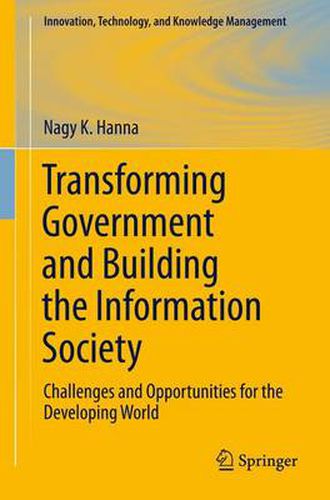Readings Newsletter
Become a Readings Member to make your shopping experience even easier.
Sign in or sign up for free!
You’re not far away from qualifying for FREE standard shipping within Australia
You’ve qualified for FREE standard shipping within Australia
The cart is loading…






This title is printed to order. This book may have been self-published. If so, we cannot guarantee the quality of the content. In the main most books will have gone through the editing process however some may not. We therefore suggest that you be aware of this before ordering this book. If in doubt check either the author or publisher’s details as we are unable to accept any returns unless they are faulty. Please contact us if you have any questions.
Information and communication technology (ICT) is central to reforming governance, innovating public services, and building inclusive information societies. Countries are learning to weave ICT into their strategies for transforming government as enterprises have learned to use ICT to innovate and transform their processes and competitive strategies. ICT-enabled transformation offers a new path to digital-era government that is responsive to the challenges of our time. It facilitates innovation, partnering, knowledge sharing, community organizing, local monitoring, accelerated learning, and participatory development.
In Transforming Government and Building the Information Society, Nagy Hanna draws on multi-disciplinary research on ICT in the public sector, and on his rich experience of over 35 years at the World Bank and other aid agencies, to identify the key ingredients for the strategic integration of ICT into governance and poverty reduction strategies. The author showcases promising practices from around the world to outline the strategic options involved in using ICT to maximize developmental impact-transforming government institutions and public services, and empowering communities for inclusion and grassroots innovation.
Despite the ICT promise, Hanna acknowledges that reforming governance and empowering poor communities are difficult long-term undertakings. Hanna moves beyond the imperatives and visions of e-transformation to strategic design and implementation options, and draws practical lessons for policymakers, reformers, innovators, community leaders, ICT specialists and development experts.
$9.00 standard shipping within Australia
FREE standard shipping within Australia for orders over $100.00
Express & International shipping calculated at checkout
This title is printed to order. This book may have been self-published. If so, we cannot guarantee the quality of the content. In the main most books will have gone through the editing process however some may not. We therefore suggest that you be aware of this before ordering this book. If in doubt check either the author or publisher’s details as we are unable to accept any returns unless they are faulty. Please contact us if you have any questions.
Information and communication technology (ICT) is central to reforming governance, innovating public services, and building inclusive information societies. Countries are learning to weave ICT into their strategies for transforming government as enterprises have learned to use ICT to innovate and transform their processes and competitive strategies. ICT-enabled transformation offers a new path to digital-era government that is responsive to the challenges of our time. It facilitates innovation, partnering, knowledge sharing, community organizing, local monitoring, accelerated learning, and participatory development.
In Transforming Government and Building the Information Society, Nagy Hanna draws on multi-disciplinary research on ICT in the public sector, and on his rich experience of over 35 years at the World Bank and other aid agencies, to identify the key ingredients for the strategic integration of ICT into governance and poverty reduction strategies. The author showcases promising practices from around the world to outline the strategic options involved in using ICT to maximize developmental impact-transforming government institutions and public services, and empowering communities for inclusion and grassroots innovation.
Despite the ICT promise, Hanna acknowledges that reforming governance and empowering poor communities are difficult long-term undertakings. Hanna moves beyond the imperatives and visions of e-transformation to strategic design and implementation options, and draws practical lessons for policymakers, reformers, innovators, community leaders, ICT specialists and development experts.